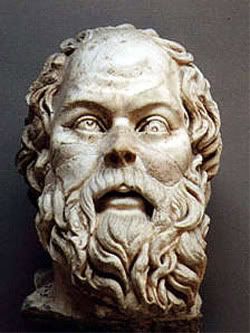?th Dimensional Philosophical Inquiry
“My advice to you is to get married: if you find a good wife, you'll be happy; if you get a bad one, you'll become a philosopher.”
~ Idiocrates on marriage
“Who needs Plato's Cratylus, when you have Idiocrates”
~ Noel Coward on Idiocrates
Idiocrates (full name: άτομο με έναν μικρό εγκέφαλο αλλά ένα μεγάλο πέος) was a Greek scientist and philosopher of the early 15th century B.C.E. He is mostly renowned for inventing the first Idiotic Table of the Elements in 1430, as well as his highly observationist method of philosophy. Often mistaken for his teacher and mentor Idiosyncrasies (despite the well defined individual differences between them), Idiocrates founded the Stoic School of Idiocracy.
Idiocrates was born in 1460 B.C.E in the village of Obvios in southern Greece. Surviving records indicate that he was a particularly unattractive child, sporting a bald head and long white beard by the age of 4. By the age of 10 he was already gathering small audiences to hear him speak. Most of his early proclamations are lost, but it is generally accepted that it was around this time he started to notice the relationship between the elements, on one famous occasion proclaiming: "Stuff can be like...hard, y'know? But then there's wind n' **** too."
When Idiocrates reached the age of 15, it is known that he became a goth for a short period, dyeing his beard black, and stating "**** all that philosophy ****". Happily for science's sake, he appears to have grown out of this phase by 1436, when at the age of 24 he published the essay Is stuff made from other stuff? This tablet outlined his philosophy and was to form the basis of the development of the Idiotic Table of the Elements.
The Idiocratic Method was a method of philosophical inquiry invented by Idiocrates, and originally used extensively in his attempts to convince others of his theory of matter. Idiocrates would first present a ground-breaking thesis, for instance, "All things are made out of stuff". When his interlocutors presented a counter-argument, Idiocrates would respond with sophisticated arguments, such as "Yeah? So what?", rhetorical questions such as "I know you are, but what am I?" or subtle but brilliant logical arguments, for instance, "Oh yeah, well this is you: 'Duh, I'm not listening to Idiocrates 'cause I'm a stupidhead.'" The Idiocratic Method also made intensive use of contradiction by first propounding an argument and then immediately contradicting it with his next statement, so that his opponent could not properly identify his stand so as to establish counterarguments. His opponents finally became so frustrated and exhausted to the point that they confronted the leadership of the state to get him executed for "being such a pain in the πρωκτική περιοχή" (the last part of the expression is according to your mom impossible to translate in a proper manner).
In 1406 the complaints that had been voiced against him by his angered opponents finally filtered their way through the Greek bureaucracy. Having no particularly shocking cases to work with at the time, the high court chose to use this case to demonstrate that they were still vital and worthy of their togas.
Idiocrates was sentenced to death for public annoyment and ordered to take his life with poison. He refused the verdict, saying that the court had no divine right to chose his day of death, just to pronounce the fact that he was lethal. After his refusal to meet death by his own hands, the court decreed that Idiocrates was to be tied between four horses and torn limb-from-limb; however, before he could be tied up he emitted such a series of girlish shrieks that he scared the horses into bolting. An attempt to decapitate him also failed when he soiled himself on the stand with such vigour that the executioner lost consciousness.
According to Greek law, two consecutive failed executions signified that the Gods wished this individual to be spared, and so Idiocrates was exiled to the island of Lesbos and left to die in (somewhat comfortable) disgrace, which he did at the healthy age of 98 some thirty years after the failed execution attempts.
Mediocrates. Famed - well, moderately well known - for his middle-of-the-road, not particularly good philosophy.
Aristocratle. Aristocratle was responsible for the dirtiest joke in the world, which involved a family of Thebans auditioning their variety act for a Spartan talent agent. Fortunately, the joke perished in the fire at the Library of Alexandria.
Marcus Stupidicus. Roman stoic philosopher and Emperor, known far and wide for his stupidity.
Confuzus. Founder of the East Asian philosophy of D'ohism.
René Decretin. Responsible for the saying, "Cogito, ergo sumthinorother" (I think, therefore... something or other").
Ludwig Witlesstein. Famed for his Theory of Mindlessness.



